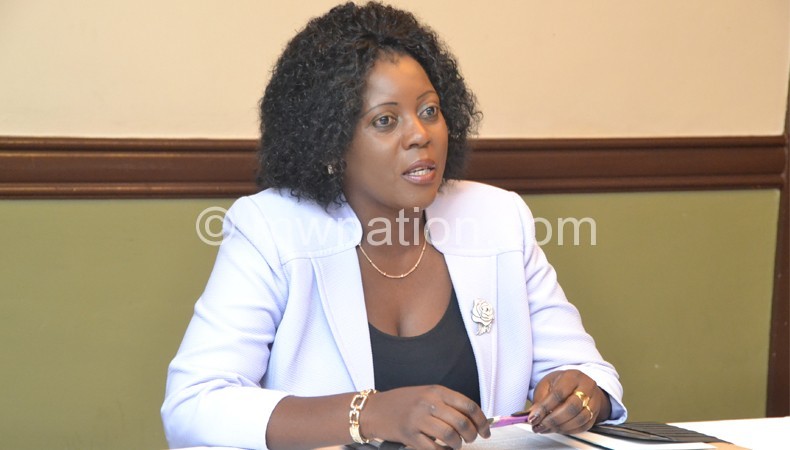Councils face financial reforms
Public Sector Reforms Commission (PSRC) has taken the reforms drive to local authorities in a bid to curb fraud and corruption and improve service delivery at council level.
In an interview in Blantyre on the sidelines of the week-long series with various district councils from the Southern Region, Nwazi Mnthambala, chief director for public sector reforms in the Office of the Vice-President, said financial reforms are necessary as they will enable councils to build the capacity to manage huge sums of money in the wake of decentralisation.

She said: “There are financial reforms that are being taken to ensure that there are efficiencies and proper management of resources, including sanctions in terms of the way they [councils] handle the rewards and sanctions to improve performance and also dealing with sanctions where there is mismanagement.
“The mother ministry [Local Government and Rural Development] is also looking into this issue seriously to ensure that whatever is being brought to the commission is in tandem with policies and aspirations of the government.”
To ensure compliance to the reforms, Mnthambala said the commission will demand quarterly reports from the councils as a monitoring tool to ensure that the pledges being made in regard to bringing financial sanity in the councils are properly tracked.

“To those in the communities, since they have representation at the district levels, it should be easy to contribute and influence some decisions as they will get feedback and progress reports,” she added.
The financial reforms session, chaired by Vice-President Saulos Chilima, come on the back of the 2015 Tilitonse Fund report that fraud and accountability queries rocked local assemblies, many of which failed to produce comprehensive expenditure reports.
Ironically, funding to the councils increased from K3 billion ($4.1 million) in 2005/06 financial year to K34.2 billion ($46.85 million) in the 2015/16 fiscal year.
Titled Political Economy Analysis of Accountability Governmental Councils, the report was based on a research conducted by Asiyatu Lorraine Chiweza, a professor in the department of political and administrative studies at Chancellor College, a constituent college of the University of Malawi.
Among others, the study noted that despite media reports pointing to accountability challenges and the prevalence of corruption in local government councils, “the nature and extent of the problem is not fully known”.
Overall, a lack of necessary reforms in the councils was said to be impinging them to generate adequate revenue, improve service delivery, improve waste management, exploit tourism potential, improve agricultural produce and education standards at district level.
Moving forward, Mnthambala said the councils are proposing broadening their revenue collection base, infrastructure development, environmental management and health services which is basically targeting the rural people.
She said: “The councils want to outsource management of markets which is one of the leakages in terms of revenue collected as well as construct new stadiums in the same revenue collection stream.
“In the lakeshore areas, they are looking at ways of wooing investors to put up factories or other tourism facilities to create employment to the rural people and increase their revenues in terms of taxes. They are also proposing value addition in the agricultural sector and land degradation issues.”
To ensure active participation from communities, Mnthambala said that the communities are well represented through the structures that are within the councils at various committee stages.
While acknowledging that it is difficult to comment on how the councils would become more transparent and accountable in the absence of the Access to Information law as it falls under the Ministry of Information and Communications Technology, Mnthambala said to improve on accountability and transparency, the councils will be required to submit quarterly reports and make presentations on their performance to the commission.
In an interview after meeting the reforms team, Blantyre district commissioner Bennet Nkasala said the key areas his council would like to work on include financial management and environmental management.
He said: “Councils as you have read in the media are getting blamed that they are no longer accountable and that they are poor at managing funds and we need to correct this as a council by being transparent and accountable in our transactions.”
Commenting on the developments, Pan-African Civic Educators Network (Pacenet) executive director Steven Duwa, whose organisation is involved in project tracking in some councils, said that while financial management remained key in the district councils, the infrastructure leaves a lot to be desired.
He said: “Financial management in the councils is most important. With regards to the decentralisation policy, we need to have people who are trusted and have the capacity to handle huge sums of money in a transparent and accountable manner. We work with the councils everyday and we believe that if we have this area reformed, then we should be hoping for better efficient councils.
“Again, our district councils have poor and below standard infrastructure.”
Malawi has 35 local government councils comprising four city councils (Blantyre, Lilongwe, Mzuzu and Zomba), two municipal councils (Luchenza in Thyolo and Kasungu), one town council (Mangochi) and 28 district councils.





